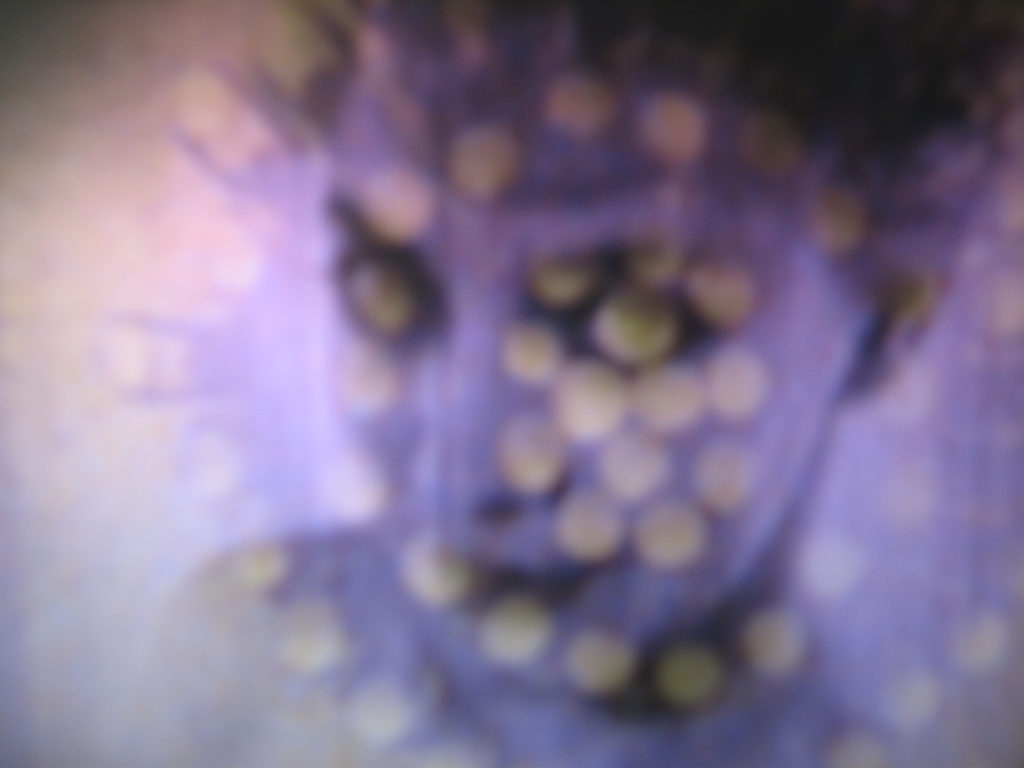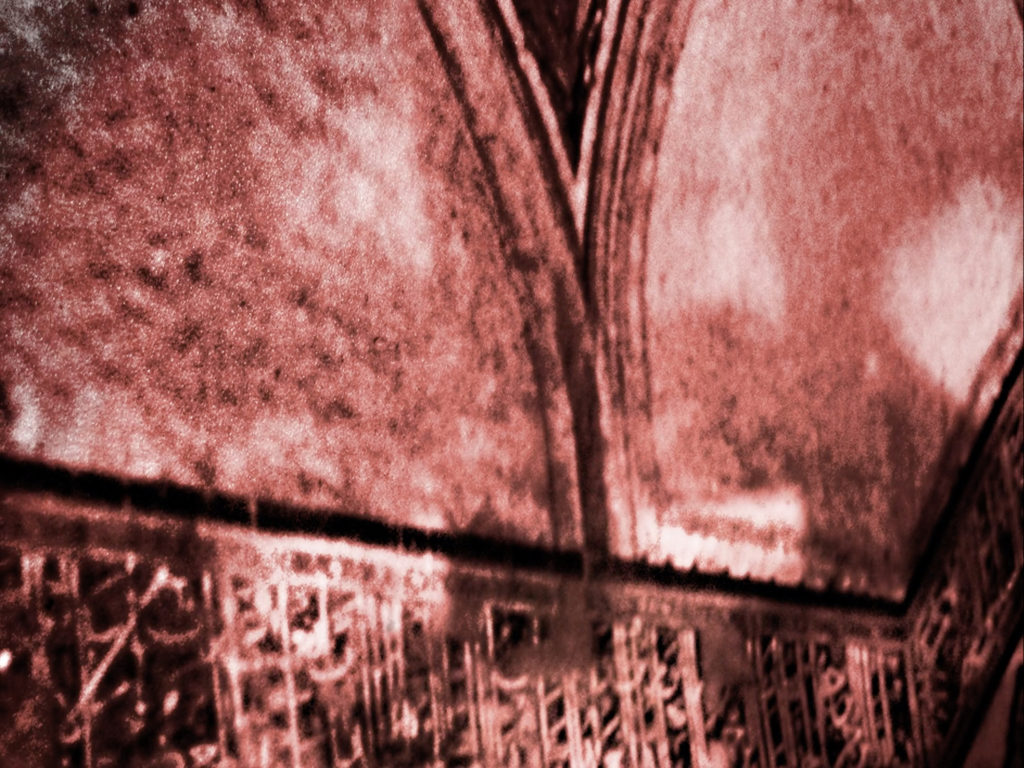Monday July 22, 7:30pm
Scrapbook: Tessa Hughes-Freeland, Raha Raissnia
Expanded Cinema Performances
Microscope is very pleased to present an evening of live expanded cinema performances by Tessa Hughes-Freeland and Raha Raissnia as the 2nd of nine performance events taking place as part of our current exhibition “Scrapbook (or, Why Can’t We Live Together)”. The night features two performances by both artists.
The female psyche and perspective is at the forefront of Hughes-Freeland’s works “INSTINCT” (2010) and “SALO REMIX” (2016), intense visual collages incorporating found footage and manipulated live through gel, lenses and other objects in which the artist accumulates image and sound to “sensual overload”.
Raissnia’s works “Nadir 3” (2016) and “Galvanoscope 4″ (2019) draw attention to the passage of time, history and the human condition, incorporating original still photographic imagery and found 35mm slides respectively. The performances also involve various manipulations of light and lenses as well as hand-pulling hand-painted film through a 35mm slide projector, with live sound by the artist.

From “INSTINCT” (2010) by Tessa Hughes-Freeland – Image courtesy of the artist
Tessa Hughes-Freeland
“INSTINCT”, 2010
By Tessa Hughes-Freeland, dual projection performance, 16mm & Super 8mm film to digital, gels, lenses, and other objects, 2010, 12 minutes
A live multiple projection, INSTINCT mixes irrationally convergent imagery. An iconography of the intangible and the intuitive, time lapses as elemental aspects of the female psyche. Psychedelic disorder and repetition, visual collage suggests an alternative syncretism. Featuring an original composition “Ataxia” by Manorexia, aka J.G. Thirwell.
Tessa Hughes-Freeland
“SALO REMIX”, 2016
By Tessa Hughes-Freeland, multiple projection performance, digital video, 35mm slides, gels, lenses, and other objects, 2016, 12 minutes
Driven by the Madame’s story, SALO REMIX pushes the perversion of violence present in the original films further. Manipulations of the image by various means with additions of optical devices and a variety of other mixed media gives way to an intense sensual overload.

From “Galvanoscope 4” (2019) by Raha Raissnia – Image courtesy of the artist and Miguel Abreu gallery
Raha Raissnia
“Galvanoscope 4”, 2019
Performance with one single 16mm film projector, hand painted 16mm film, cardboard, live sound, 9 minutes
The film used in this performance was made from re-photographing and re-filming parts of a series of found slides documenting an abandoned 14th century mosque that I mixed and layered with imagery I filmed directly from surfaces of some of my paintings. The sound played live by me with a synthesizer will be an attempt to respond to all the play between moving and still imagery, as well as texture and tone seen in the film. – RR
Raha Raissnia
“Nadir 3”, 2016
Performance for one prepared antique 35mm projector, hand painted 35mm film strip, live sound, duration variable
This piece consists of a long strip of 35mm hand painted collage film that I hand feed and manipulate through an old 35mm slide projector. The imagery is derived from a series of still photographs I have recently taken in my studio. The basic structural elements: light, lens, film and screen are all here directly manipulated by hand. It is a reductive piece that is visceral and tactile, expressing an emotional response to the human condition. – RR
General admission $10
Students & Members $8
_
Tessa Hughes-Freeland works in a variety of formats and mediums, and her films have been shown in diverse venues, ranging from internationally prominent museums to seedy bars in gritty neighborhoods. Her work is best described as “confrontational, transgressive, provocative and poetic”. Her films have screened internationally in North America, Europe and Australia and in prominent museums and galleries, including the Museum of Modern Art, the Museum of Contemporary Art, Los Angeles, the Whitney Museum of American Art, the New Museum of Contemporary Art in New York, and the KW Institute of Contemporary Art in Berlin. In 2018 a program of her films was included in the “No–Wave, Transgression” Film Series at MoMA. Currently 5 of her films are included in an exhibition touring museums in Asia. Hughes-Freeland has been a juror for several festivals, and has programmed extensively, most recently for “Punk Lust: Radical Provocation 1971-85 “ on view at The Museum of Sex. She lives and works in New York.
Raha Raissnia (b. 1968, Tehran, Iran) received her BFA from the School of the Art institute of Chicago in 1992 and her MFA from Pratt Institute in 2002. In the interim, her interest in avant-garde filmmaking led her to work at Anthology Film Archives (1995– 1999), where she has also exhibited. Raissnia presented a solo exhibition of new work in 2017-18 at the Drawing Center (New York). In 2016, her work was the subject of a solo presentation at the Museum of Modern Art (New York). In 2015, Raissnia’s work was included in All the World’s Futures, 56th International Art Exhibition, curated by Okwui Enwezor, Venice Biennale. Previously, her work has been featured in exhibitions at White Columns (New York), Access Gallery (Vancouver), the Museum of Contemporary Art St. Louis, Khastoo Gallery (Los Angeles), Thomas Dane Gallery (London) and The Kitchen (New York), among others. Recent solo shows were held at The Drawing Center (New York), Ab/Anbar Gallery (Tehran), Galeria Marta Cervera (Madrid), Galerie Xippas (Paris), and the Isfahan Museum of Contemporary Art (Isfahan, Iran). Raissnia’s projection performances — often undertaken in collaboration with Aki Onda and Panagiotis Mavridis, Dalius Naujo, John Zorn — have been held at the Whitney Museum of American Art (New York), REDCAT (Los Angeles), Kunsthal Rotterdam, Arnolfini – Center for Contemporary Arts (Bristol, UK), the Drawing Center (New York), Issue Project Room (New York), Microscope Gallery and Emily Harvey Foundation (New York), among others. Raissnia’s sixth one-person exhibition at Miguel Abreu Gallery was on display in the winter of 2019.
_
Microscope Gallery Event Series 2019 is sponsored, in part, by the Greater New York Arts Development Fund of the New York City Department of Cultural Affairs, administered by Brooklyn Arts Council (BAC).
